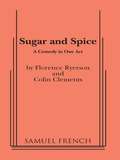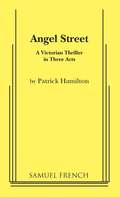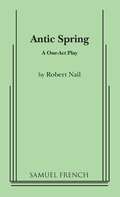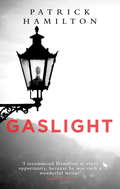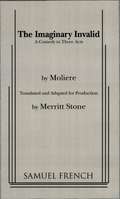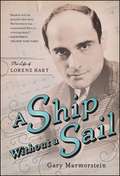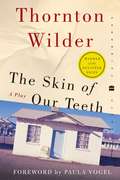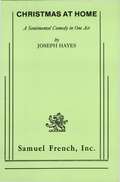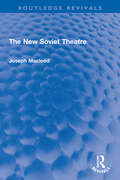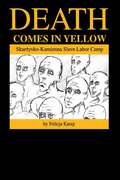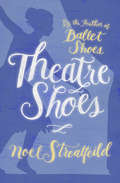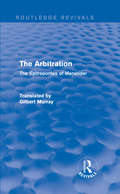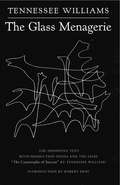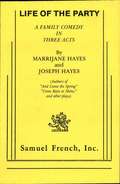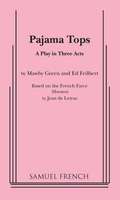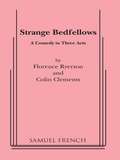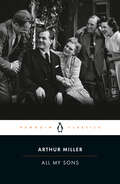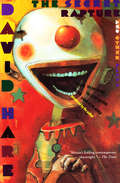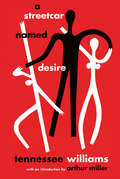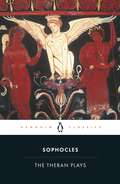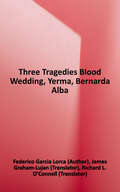- Table View
- List View
Sugar & Spice
by Florence RyersonComedy / 2m, 3f / Interior / Jane Jones, almost sixteen, is visited by a young friend who has just returned from Paris with a boy complex and some acquired mannerisms which infuriate Jane. When the friend takes Jane's boyfriend, Chump Edwards, right out from under her nose, Jane is roused to a realization of Chump's worth and takes him back again. She also learns a great truth-- that more boys are caught with sugar than with vinegar.
Angel Street
by Patrick HamiltonMelodrama, 2 m, 3 f, 2 extras; A Broadway hit first produced on the West End under the title Gaslight and filmed twice, Angel Street tells the story of the Manninghams who live on Angel Street in 19th Century London. As the curtain rises, all appears the essence of Victorian tranquility. It is soon apparent however, that Mr. Manningham, a suavely handsome man, is slowly driving his gentle, devoted wife Bella, to the brink of insanity with an insinuating kindness which masks more sinsister motives. While he is out, Mrs. Manningham has an unexpected caller: amiable, paternal Inspector Rough from Scotland Yard. Rough is convinced that Manningham is a homicidal maniac wanted for a murder committed fifteen years earlier in this very house. Gradually the inspector restores Bella's confidence in herself and as the evidence against Manningham unfolds, the author has built and sustained some of the most brilliant, suspenseful sequences in modern theatre.
Antic Street
by Robert NailComedy, 3m, 3f; Placing emphasis on pantomine and character portrayal, it needs only six chairs-- to represent an open touring car. In the car are young people of high school age going on a picnic. There is Ginger, earnest and overbearingly sunny; Robert, the sensitive one, impressed only by poetry (or ants, as a hilarious final scene proves); Blossom, the exuberant and idiotic teenager; Sam and Gwendolyn, the lovers who live-- in thirty minutes-- a life of adolescent violence, ranging from rage to young soulfulness; and Elbert, the little brother who looks with noisy criticism on their actions and suffers their company only for the food likely to be served. The relations of these, oddly assorted six, put to the trials and tribulations of a picnic, result in situations of merriment and in dialogue flippant, fast and rich in performance possibilities.
Gaslight
by Patrick HamiltonThis classic Victorian thriller was first produced in 1935. Jack Manningham is slowly, deliberately driving his wife, Bella, insane. He has almost succeeded when help arrives in the form of a former detective, Rough, who believes Manningham to be a thief and murderer. Aided by Bella, Rough proves Manningham's true identity and finally Bella achieves a few moments of sweet revenge for the suffering inflicted on her.
Imaginary Invalid (Stone)
by MoliereComedy / 8m, 4f / Interior / Monsieur Ardin, the imaginary invalid, is a thoroughgoing hypochondriac. His daughter, Angelique, is in love with Cleante. But Ardin insists that she shall marry the son of a doctor and a doctor himself, Thomas Defois. Toinette, the maid and Beralde, Ardin's brother, do everything possible to dissuade Ardin in his determination to marry Angelique to the stupid Thomas. Beline, Ardin's shrewish wife, is determined that Angelique shall become a nun so that there will be no one but she, Beline, to inherit Ardin's estate. By many tricks, Toinette and Beralde show up Beline as the mercenary she is and the doctors as the fools they are.
Shakespeare
by Mark Van Doren34 chapters of critical and interpretative comment on each of the Bard's plays with another chapter on his poems
The Doctor's Dilemma
by Dan Laurence George Bernard ShawShaw's humorous satire of the medical profession.
A Ship Without A Sail: The Life of Lorenz Hart
by Gary MarmorsteinAn unforgettable portrait of an exuberant yet troubled artist who so enriched the American songbook "Blue Moon, " "Where or When, " "The Lady Is a Tramp," "My Funny Valentine," "Isn't It Romantic?," "My Romance," "There's a Small Hotel," "Falling in Love with Love," "Bewitched, Bothered and Bewildered"--lyricist Lorenz Hart, together with composer Richard Rodgers, wrote some of the most memorable songs ever created. More than half a century after their collaboration ended, Rodgers & Hart songs are indispensable to the repertoire of nightclub singers everywhere. A Ship Without a Sail is the story of the complicated man who was Lorenz Hart. His lyrics spin with brilliance and sophistication, yet at their core is an unmistakable wistfulness. The sweetness of "My Romance" and "Isn't It Romantic?" is unsurpassed in American song, but Hart's lyrics could also be cynical, funny, ironic. He brought a unique wit and elegance to popular music. Larry Hart and Richard Rodgers wrote approximately thirty Broadway musicals and dozens of songs for Hollywood films. At least four of their musicals--On Your Toes, Babes in Arms, The Boys from Syracuse, and Pal Joey-- have become classics. But despite their prodigious collaboration, Rodgers and Hart were an odd couple. Rodgers was precise, punctual, heterosexual, handsome, and eager to be accepted by Society. Hart was barely five feet tall, alcoholic, homosexual, and more comfortable in a bar or restaurant than anywhere else. Terrified of solitude, he invariably threw the party and picked up the check. His lyrics are all the more remarkable considering that he never sustained a romantic relationship, living his entire life with his mother, who died only months before he died at age forty-eight. Gary Marmorstein's revelatory biography includes many of the lyrics that define Hart's legacy--those clever, touching stanzas that still move us or make us laugh.
The Skin of Our Teeth: A Play (Perennial Classics Ser.)
by Thornton WilderA timeless statement about human foibles . . . and human endurance, this beautiful new edition features Wilder's unpublished production notes, diary entries, and other illuminating documentary material, all of which is included in a new Afterword by Tappan Wilder.Time magazine called The Skin of Our Teeth "a sort of Hellzapoppin' with brains," as it broke from established theatrical conventions and walked off with the 1943 Pulitzer Prize for Best Drama. Combining farce, burlesque, and satire (among other styles), Thornton Wilder departs from his studied use of nostalgia and sentiment in Our Town to have an Eternal Family narrowly escape one disaster after another, from ancient times to the present. Meet George and Maggie Antrobus (married only 5,000 years); their two children, Gladys and Henry (perfect in every way!); and their maid, Sabina (the ageless vamp) as they overcome ice, flood, and war -- by the skin of their teeth.
Christmas at Home
by Joseph HayesShort Christmas Comedy / 3m, 4f / Interior / The day before Christmas finds the Burgess family busy with preparations and poignantly aware that this is the first year the members of the family will not be together; son Johnny is in Chicago, and Grandpa had died last summer. But the Burgesses do not feel sorry for themselves; they realize how happy and well off they are. In humorous and touching scenes, we see sixteen year-old Julie falling in love for the first time; eighteen year-old Emily receiving a proposal of marriage; twelve year-old Janet learning the real meaning of Christmas.
The New Soviet Theatre (Routledge Revivals)
by Joseph MacleodFirst Published in 1943, The New Soviet Theatre presents Joseph Macleod’s take on the development and rapid changes in the Soviet Theatre since late 1930s. Through scattered articles and reports, books and bulletins, and his own visits to the USSR, Macleod showcases what we know as ‘Socialist Realism’. He brings themes like the shortcomings of the old theatre; the audience beyond the Caucasus; new socialist audiences; Alexey Popov of the Central Theatre of the Red Army; new writers and new plays; and popularity of Shakespeare both in the central theatres and in remoter and unexpected places. Written graphically but founded on scholarship this book will be an essential read for scholars and researchers of history of theatre, European theatre, theatre and performance studies.
Androcles and the Lion
by Dan Laurence George Bernard ShawAndrocles and the Lion is a 1912 play written by George Bernard Shaw.Androcles and the Lion is Shaw's retelling of the tale of Androcles, a slave who is saved by the requited mercy of a lion. In the play, Shaw makes Androcles out to be one of many Christians being led to the Colosseum for torture. Characters in the play exemplify several themes and takes on both modern and supposed early Christianity, including cultural clash between Jesus' teachings and traditional Roman values.
Death Comes in Yellow
by Felicja KarayDeath Comes in Yellow" presents the history of one slave labor camp in order to shed light on all aspects of the slave labor camps established in Poland under German occupation. Hasag-Skarzysko was one of hundreds of camps scattered throughout occupied Poland. They were distinguished by size, the nationality of the prisoners, their location, the date of their establishment, and the authority in charge. The large number of labor camps reflected the German policy of exploiting the work forces of the occupied countries. These camps were part of a Europe-wide system of forced labor.The first part of this volume reviews the external history of the camp. The second section, which studies the internal workings of the camp, is quite different in approach and includes an analysis of prisoner society and a moving description of the individual prisoner's struggle to survive.
Theatre Shoes
by Noel StreatfeildThis captivating companion to Ballet Shoes tells the story of 3 orphans who become students at a famous theatre school After their father disappeared in the war, Sorrell, Holly, and Mark Forbes were sent to live with their grandfather. When he dies, the three orphans are on the move again--this time to London, where their maternal grandmother is a well-known actress. The city is a strange, bustling place that frightens young Holly, but the siblings' new home at 14 Ponsonby Square has a garden that instantly enchants them. Their grandmother enrols them at the Children's Academy of Dancing and Stage Training, where they'll carry on the tradition of their famous theatre family, which includes cousins they never knew they had. Stuck-up Miranda thinks she can act better than Sorrel; homesick Mark discovers he can sing; and Holly is a natural dancer. Will Sorrel, Holly, and Mark live up to their family legacy?
The Arbitration: The Epitrepontes of Menander (Routledge Revivals)
by Gilbert MurrayGilbert Murray translated and made available to modern readers The Epitrepontes of Menander or The Arbitration for the first time in 1945. The Arbitration is among the most frequently quoted and most famous of Menander’s plays and – being less farcical than others - belongs to his mature style. With an interesting and informative introduction, this translation will be of value to any student of Classics and Ancient Greek drama.
The Glass Menagerie: Curriculum Unit (New Directions Book Ser.)
by Robert Bray Tennessee WilliamsNo play in the modern theatre has so captured the imagination and heart of the American public as Tennessee Williams's The Glass Menagerie. <P><P>Menagerie was Williams's first popular success and launched the brilliant, if somewhat controversial, career of our pre-eminent lyric playwright. <P>Since its premiere in Chicago in 1944, with the legendary Laurette Taylor in the role of Amanda, the play has been the bravura piece for great actresses from Jessica Tandy to Joanne Woodward, and is studied and performed in classrooms and theatres around the world. <P>The Glass Menagerie (in the reading text the author preferred) is now available only in its New Directions Paperbook edition. <P>A new introduction by prominent Williams scholar Robert Bray, editor of The Tennessee Williams Annual Review, reappraises the play more than half a century after it won the New York Drama Critics Circle Award: "More than fifty years after telling his story of a family whose lives form a triangle of quiet desperation, Williams's mellifluous voice still resonates deeply and universally." <P>This edition of The Glass Menagerie also includes Williams's essay on the impact of sudden fame on a struggling writer, "The Catastrophe of Success," as well as a short section of Williams's own "Production Notes." <P>The cover features the classic line drawing by Alvin Lustig, originally done for the 1949 New Directions edition.
Life Of the Party
by Marrijane HayesComedy / 7m, 10f / Interior / The Hughes family moves to Butterfield and begins to choose friends. Mr. Hughes is there on business. Mrs. Hughes has social ambitions. Oldest daughter Mildred fancies herself in love with the snooty son of a bank president. Studious daughter Jean flings off her glasses and becomes the life of the party. Dapper Teddy gets into a merry mix up juggling four dates at once. And daughter Amy falls in love for the first time. But the whole family is in for a hard awakening. They all become aware of the serious implications of what had seemed very funny and make wise readjustments to one another and to life.
Pajama Tops
by Mawby GreenMawby Green and Ed Feilbertfrom the French hit Magma by Jean de Letraz. Farce . Characters: 4 male, 3 female. Interior Set. It played three years in Paris and five in Hollywood before coming to New York, followed by 10 years coast-to-coast and six in London, making it one of the longest runs on record! The plot is all fun. The husband is planning a business trip for philandering purposes; his wife secretly invites this same voluptuous girl to spend the weekend. The husband is trapped. Out of the blue an old friend appears, with hands aflutter, followed by a gendarme who delights in cherchez les femmes. There is also a devilish looking butler, a maid practising to be a cocotte, and some wildly artful dodging, all calculated to keep the audience laughing. . "An utterly mad spoof of the French bedroom farce"-The New York World Telegram & Sun. "Prolonged laughter."-The New York Times . "The best entertainment in London."-London Sunday Times
Strange Bedfellows
by Florence RyersonComedy \ 7 m., 11 f. \ Int. \ Senator Cromwell, an old line politician who keeps his women under stern rule, has a new daughter in law. When he learns Matthew's bride is a feminist leader campaigning for the Women's Rights Bill due to come up in the same election Matthew is running in for re election to Congress, there is an explosion which shakes the family and threatens Matthew's marriage. \ "If you're looking for laughs, don't miss Strange Bedfellows ." N.Y. Mirror
All My Sons
by Arthur MillerCelebrating the Arthur Miller centennial year, an eye-catching new Penguin Plays edition of the work that established him as a leading voice in the American theater In 1947, Arthur Miller exploded onto Broadway with his first major work, All My Sons, winning both the New York Drama Critics' Circle Award for Best New Play and the Tony for Best Author. The play introduced themes that would preoccupy Miller throughout his career: the relationships between fathers and sons and the conflict between business and personal ethics. This striking new edition adds All My Sons to the elegant Penguin Plays series--now in beautifully redesigned covers. Joe Keller and Steve Deever, partners in a machine shop during World War II, turned out defective airplane parts, causing the deaths of many men. Deever was sent to prison while Keller escaped punishment and went back to business, making himself very wealthy in the ensuing years. A love affair between Keller's son, Chris, and Ann Deever, Steve's daughter; the bitterness of George Deever, who returns from the war to find his father in prison and his father's partner free; and the reaction of Chris Keller to his father's guilt escalate toward a climax of electrifying intensity.From the Trade Paperback edition.
All My Sons: Drama Curriculum Unit (Hereford Plays Ser.)
by Arthur Miller Christopher W. BigsbyJoe Keller and Steve Deever, partners in a machine shop during World War II, turned out defective airplane parts, causing the deaths of many men. Deever was sent to prison while Keller escaped punishment and went back to business, making himself very wealthy in the ensuing years. In Miller's work of tremendous power, a love affair between Keller's son, Chris, and Ann Deever, Steve's daughter, the bitterness of George Keller, who returns from the war to find his father in prison and his father's partner free, and the reaction of a son to his father's guilt escalate toward a climax of electrifying intensity. Winner of the Drama Critics' Award for Best New Play in 1947, All My Sons established Arthur Miller as a leading voice in the American theater. All My Sons introduced themes that thread through Miller's work as a whole: the relationships between fathers and sons and the conflict between business and personal ethics. This edition features an introduction by Christopher Bigsby.For more than seventy years, Penguin has been the leading publisher of classic literature in the English-speaking world. With more than 1,700 titles, Penguin Classics represents a global bookshelf of the best works throughout history and across genres and disciplines. Readers trust the series to provide authoritative texts enhanced by introductions and notes by distinguished scholars and contemporary authors, as well as up-to-date translations by award-winning translators.
The Secret Rapture and Other Plays: Fanshen - A Map Of The World - Saigon - The Bay At Nice (Books That Changed the World)
by David HareA collection of five plays fromthe Tony Award–winning playwright and screenwriter, &“the premiere political dramatist writing in English&” (The Washington Post). David Hare, &“Britain&’s leading contemporary playwright,&” has established a unique reputation for plays that are at once personal and political, deeply serious and incredibly funny (The Times). He is the author of seventeen plays, many of which have been presented on Broadway. Included in this collection are Fanshen; A Map of the World; Saigon: Year of the Cat; The Bay at Nice; and The Secret Rapture. Of the title play, Frank Rich of The New York Times said, &“The Secret Rapture has gone further than before in marrying political thought to the compelling drama of lives that refuse to conform to any ideology&’s utopian plan . . . Mr. Hare embraces the human, messy though it may be.&” Praise for David Hare Fanshen &“The nearest any English contemporary writer has come to emulating Brecht.&” —Financial Times A Map of the World &“Mr. Hare&’s A Map of the World, which passionately embraces utopia without arrogantly presuming to annex it, is original and provocative.&” —The New York Times Saigon &“An impressive new film which vividly captures the last desperate days in Vietnam as the Reds laid siege to the sweltering city.&” —Daily Express The Bay at Nice &“Witty, cerebral, and full of fine-spun ironies.&” —The Guardian The Secret Rapture &“His writing, as always, is smart, and this time, glorious. The characters are unhackneyed and complex; the insights are tough and hard to ignore.&” —New York Newsday
A Streetcar Named Desire
by Arthur Miller Tennessee WilliamsThe Pulitzer Prize and Drama Critics Circle Award winning play--reissued with an introduction by Arthur Miller (Death of a Salesman and The Crucible), and Williams' essay "The World I Live In." It is a very short list of 20th-century American plays that continue to have the same power and impact as when they first appeared--57 years after its Broadway premiere, Tennessee Williams' A Streetcar Named Desire is one of those plays. The story famously recounts how the faded and promiscuous Blanche DuBois is pushed over the edge by her sexy and brutal brother-in-law, Stanley Kowalski. Streetcar launched the careers of Marlon Brando, Jessica Tandy, Kim Hunter and Karl Malden, and solidified the position of Tennessee Williams as one of the most important young playwrights of his generation, as well as that of Elia Kazan as the greatest American stage director of the '40s and '50s. Who better than America's elder statesman of the theater, Williams' contemporary Arthur Miller, to write as a witness to the lightning that struck American culture in the form of A Streetcar Named Desire? Miller's rich perspective on Williams' singular style of poetic dialogue, sensitive characters, and dramatic violence makes this a unique and valuable new edition of A Streetcar Named Desire. This definitive new edition will also include Williams' essay "The World I Live In," and a brief chronology of the author's life.
The Theban Plays: Antigone - Oedipus The King - Oedipus At Colonus (hardcover)
by SophoclesKing Oedipus/Oedipus at Colonus/AntigoneThree towering works of Greek tragedy depicting the inexorable downfall of a doomed royal dynastyThe legends surrounding the house of Thebes inspired Sophocles to create this powerful trilogy about humanity's struggle against fate. King Oedipus is the devastating portrayal of a ruler who brings pestilence to Thebes for crimes he does not realize he has committed and then inflicts a brutal punishment upon himself. Oedipus at Colonus provides a fitting conclusion to the life of the aged and blinded king, while Antigone depicts the fall of the next generation, through the conflict between a young woman ruled by her conscience and a king too confident of his own authority.Translated with an Introduction by E. F. WATLING
Three Tragedies: Blood Wedding, Yerma, Bernarda Alba
by Federico Garcia LorcaHere in the authorized translation by James Graham-Luján and Richard L. O’Connell, with an illuminating biographical introduction by the poet’s brother, Francisco García Lorca, are three tragic dramas by the great modern Spanish poet and playwright which have caught the imagination and won the critical acclaim of the literate world. <p><p>Blood Wedding. Concerned with love that cannot become marriage among the primitive hill people of Castile, this is a play of the workings of tremendous passions and tribal ritual toward an inescapable tragic end. Yerma. "The whole tragic burden of Yerma is measured by the deepening of her struggle with the problem of frustrated motherhood." -From García Lorca, by Edwin Honig. The House of Bernarda Alba. Again in "Women Who Love Moves to Tragedy," Bernarda Alba tells of the repression of five daughters by a domineering mother, of how their natural spirits circumvent her but bring violence and death.
